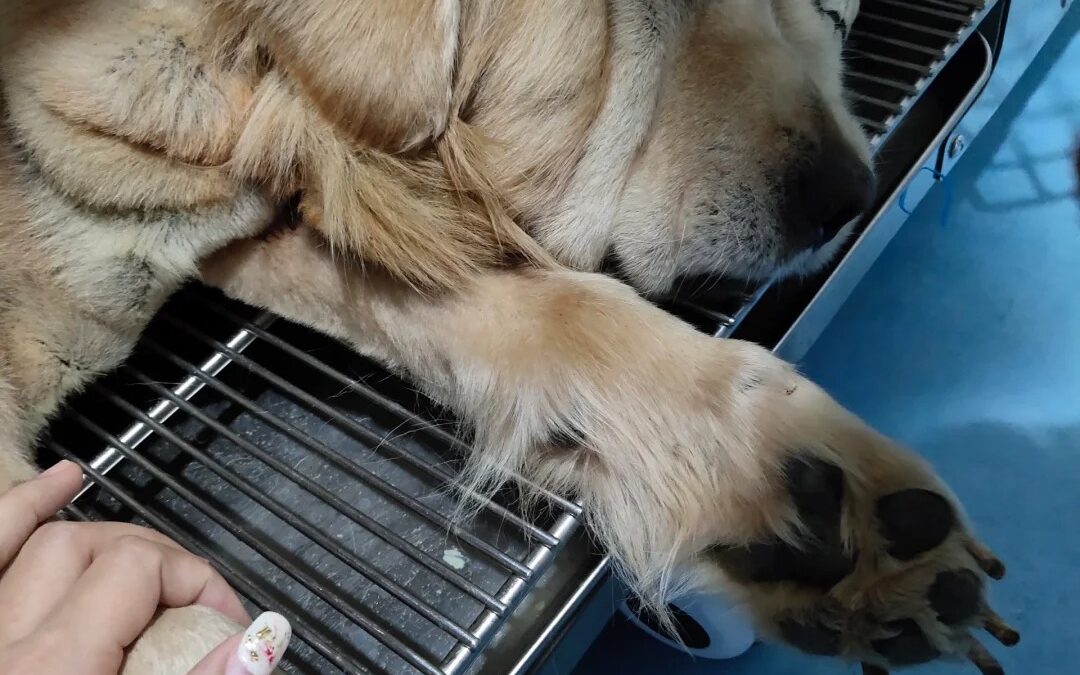
by TCMVET | Apr 20, 2024 | Dog Cancer & Tumors
Introduction Discovering a lipoma on your dog can be unsettling. These benign fatty tumors are common in dogs, especially as they age. Understanding what lipomas are, how they can affect your dog, and the options available for managing them is crucial for maintaining your pet’s health and comfort.
Understanding Lipomas Lipomas are non-cancerous tumors composed mostly of fat cells and are typically found under the skin in various parts of the body. They are soft, generally painless, and have a rubbery texture. While lipomas are not dangerous, their location and size can occasionally impact your dog’s quality of life.
Early Detection and Diagnosis Regular petting and grooming of your dog can help you catch these lumps early. If you notice a new lump, it’s important to have it examined by a veterinarian. Diagnostics may include a physical examination, fine-needle aspiration, or biopsy to confirm that it is a benign lipoma.
Management Strategies
- Monitoring: Many veterinarians recommend monitoring a lipoma for growth or changes before taking more invasive actions.
- Surgical Removal: If a lipoma becomes large enough to hinder movement or is aesthetically concerning, surgical removal might be recommended. This is a relatively straightforward procedure, and recovery is usually quick.
- Weight Management and Diet: Keeping your dog at a healthy weight can prevent new lipomas from forming and reduce the growth rate of existing ones. Discuss with your vet about a tailored diet plan that supports weight management.
Conclusion Lipomas are a common occurrence in dogs and are generally not a cause for alarm. With proper monitoring and care, dogs with lipomas can continue to live happy, full lives. Regular check-ups with your veterinarian are key to managing your pet’s health and ensuring any potential issues are addressed promptly.
-1000x675.jpg)
by TCMVET | Apr 18, 2024 | Dog Cancer & Tumors
TCMVET Baituxiao is especially beneficial for pets dealing with various types of tumors and cancers, such as mammary tumors and lymphomas. Additionally, its ingredients help alleviate common postoperative issues like pain and inflammation, and assist in managing chronic conditions associated with aging pets. For pets prone to tumors or those in need of an immunity boost, this supplement can be a proactive step towards maintaining a healthy, happy life.

by TCMVET | Mar 25, 2024 | Dog Cancer & Tumors
In the realm of pet care, few things are as distressing as witnessing our beloved companions battle against illness, especially when it comes to formidable foes like tumors. Yet, amidst such challenges, there shines a beacon of hope: TCMVET Baituxiao.
A Story of Struggle and Hope Imagine the plight of a helpless dog, writhing in pain, collapsing under the weight of a massive tumor, and crying out in desperate agony. This poignant image encapsulates the harsh reality faced by many pets and their owners. However, within this darkness lies a glimmer of hope – the potential for relief and healing through the innovative approach of TCMVET Baituxiao.
Understanding TCMVET Baituxiao: A Holistic Solution TCMVET Baituxiao represents a paradigm shift in pet healthcare, drawing upon the rich heritage of Traditional Chinese Medicine (TCM) to offer a holistic solution to various health challenges, including tumors. At its core, Baituxiao aims to restore balance and harmony within the body, bolstering the immune system, reducing inflammation, and potentially aiding in tumor management.
Case Study: A Compelling Journey of Healing Consider the case of a courageous dog facing a life-threatening tumor. Despite the odds stacked against them, the introduction of TCMVET Baituxiao into their treatment regimen marked a turning point in their journey. With diligent care and the support of Baituxiao’s unique blend of herbal remedies, the dog experienced a remarkable improvement in their condition. Gradually, the once agonizing cries were replaced by signs of comfort and vitality, offering a glimmer of hope to their devoted owner.
The Power of Integration: Complementing Conventional Treatment It’s essential to highlight that TCMVET Baituxiao is not a standalone solution but rather a complementary approach to conventional veterinary care. Before embarking on any new supplement or treatment, consulting with a trusted veterinarian is paramount. By integrating Baituxiao into a comprehensive treatment plan, pet owners can harness the collective benefits of both Eastern and Western medicine, maximizing the potential for their pet’s well-being.
Empowering Pet Owners: A Call to Action In conclusion, the journey of pet care is often fraught with challenges, yet it is also filled with moments of profound resilience and hope. TCMVET Baituxiao stands as a testament to the enduring bond between humans and animals, offering a beacon of healing and relief in the face of adversity. As responsible pet owners, let us embrace this opportunity to explore holistic avenues of care and empower our furry companions to live their best lives.
With TCMVET Baituxiao, the path to healing begins anew, promising a brighter and healthier future for our beloved pets.

by TCMVET | Mar 23, 2024 | Dog Cancer & Tumors
In the ever-evolving field of veterinary medicine, a novel approach is gaining momentum: the use of herbal remedies in treating canine mast cell tumors (MCTs). This approach, which might sound unconventional to some, is rooted in a deep understanding of both the ancient wisdom of herbal medicine and the modern scientific methodology. The integration of these methodologies is not just a trend but a revolutionary step forward in veterinary oncology, offering new hope and options for our beloved four-legged friends diagnosed with MCTs.
Understanding Canine Mast Cell Tumors
MCTs are among the most common skin tumors in dogs, accounting for about 20% of all skin tumors in canines. These tumors can vary widely in their behavior, appearance, and prognosis, making them a complex challenge for veterinarians. Traditionally, treatment options have included surgery, chemotherapy, and radiation therapy, but these methods, while effective, often come with significant side effects.
The Rise of Herbal Remedies in Veterinary Oncology
In recent years, there has been a growing interest in the potential of herbal medicine to provide a more holistic approach to cancer treatment. Herbs have been used for thousands of years in human medicine, and their application in veterinary medicine, especially for cancer treatment, is now being explored with promising results.
Key Herbs and Their Potential Benefits
Some of the herbs commonly used in the treatment of canine MCTs include:
- Astragalus: Known for its immune-boosting properties, it may help in strengthening the body’s natural defense system.
- Szechuan Lovage: Believed to improve blood circulation, which is crucial in delivering nutrients and medications to the affected areas.
- Rehmannia glutinosa: Has anti-inflammatory properties, which can be beneficial in managing tumors.
Integrating Herbs with Conventional Treatments
One of the most significant aspects of using herbs in treating MCTs is their potential to be integrated with conventional treatments. This integrative approach can offer a more comprehensive treatment plan, targeting the tumor while supporting the overall health and well-being of the dog.
Navigating the Challenges and Considerations
While the use of herbal remedies is promising, it is not without challenges. The quality, dosage, and type of herb, as well as its interaction with other medications, are crucial factors to consider. Therefore, it is essential that any herbal treatment plan be developed and monitored by a veterinarian experienced in both oncology and herbal medicine.
As we continue to seek better ways to treat canine MCTs, the use of herbal remedies offers a fascinating and potentially game-changing approach. With their ability to integrate seamlessly with traditional treatments and offer a more holistic approach, herbs are carving out a significant niche in the field of veterinary oncology. The journey of “Herbs for Hounds” is just beginning, and the possibilities it holds for revolutionizing the treatment of canine mast cell tumors are as vast as they are exciting.

by TCMVET | Mar 23, 2024 | Dog Cancer & Tumors
In the evolving world of veterinary oncology, the management of canine mast cell tumors (MCTs) is witnessing a significant paradigm shift. Traditional treatment options like surgery, chemotherapy, and radiation therapy have long been the standard. However, the integration of herbal medicine into treatment regimens is emerging as a new frontier, offering a complementary approach that may enhance outcomes for our canine companions.
Understanding Canine Mast Cell Tumors
MCTs are among the most common skin tumors in dogs, known for their unpredictable behavior and varying degrees of aggressiveness. These tumors arise from mast cells, which are part of the immune system. Treatment complexity arises from the tumor’s ability to mimic benign conditions and its potential to be highly metastatic.
The Role of Herbal Medicine in MCT Management
Herbal medicine, particularly from the rich tradition of Traditional Chinese Medicine (TCM), is gaining traction in the veterinary field. TCM focuses on restoring the balance within the body and views disease as a manifestation of imbalance. Herbs used in TCM are chosen for their properties that align with this philosophy, aiming to restore harmony and support the body’s natural healing processes.
Key Herbal Ingredients and Their Benefits
Several herbs stand out for their potential benefits in managing MCTs:
- Astragalus: Known for its immune-boosting properties, it may help strengthen the dog’s overall health and resistance.
- Turmeric (Curcumin): Has anti-inflammatory and antioxidant properties, potentially beneficial in reducing tumor proliferation.
- Cordyceps: An adaptogen that could improve stamina and support the immune system.
Integrating Herbal Medicine with Conventional Treatments
The beauty of incorporating herbal medicine lies in its ability to complement conventional treatments. For instance, herbs might help alleviate side effects of chemotherapy, enhance the body’s response to treatment, and potentially reduce tumor growth.
The Importance of a Tailored Approach
Each dog’s case of MCT is unique, necessitating a personalized approach. Herbal treatments should be tailored by a veterinarian knowledgeable in both traditional and holistic medicine, ensuring the herbal regimen is appropriate and safe.
Advantages of Herbal Medicine
The holistic nature of herbal medicine means it not only targets the tumor but also supports the overall well-being of the dog. It emphasizes on improving quality of life and potentially prolonging survival.
Herbal medicine represents a promising adjunct to traditional treatments for canine mast cell tumors. As we continue to explore and understand its benefits, this approach is likely to become a staple in holistic veterinary care, offering a more integrated and comprehensive treatment path for our beloved pets.

by TCMVET | Mar 23, 2024 | Dog Cancer & Tumors
The field of veterinary oncology is witnessing a paradigm shift with the integration of holistic care approaches, particularly through the use of Traditional Chinese Herbal Medicine (TCM) in treating dog tumors. This approach represents a complementary method, working alongside conventional treatments like surgery, chemotherapy, and radiation, to provide a more rounded care for dogs diagnosed with cancer.
Understanding the Role of TCM in Canine Oncology
TCM, with its centuries-old history, focuses on treating the whole patient rather than just the symptoms or the disease itself. The core principle of TCM is to restore and maintain balance in the body’s energy, or Qi. When it comes to canine tumors, TCM addresses the underlying imbalances that contribute to the disease, which could be Qi stagnation, blood stasis, or an imbalance in Yin and Yang.
Key Herbs in TCM for Dog Tumors
TCM utilizes a variety of herbs that are known for their cancer-fighting properties. Astragalus, for instance, is celebrated for boosting the immune system, which is crucial for dogs undergoing cancer treatment. Szechuan lovage, another vital herb, is known for improving blood circulation, essential for transporting nutrients and medicinal compounds throughout the body. Herbs like Rehmannia glutinosa have anti-inflammatory properties, which help in reducing the inflammation often associated with cancer.
Synergy with Conventional Cancer Treatments
The most notable aspect of incorporating Chinese herbs into canine cancer treatment is their ability to complement conventional treatments. While the primary treatments focus on eliminating cancer cells, TCM works to strengthen the dog’s overall constitution, thereby enhancing the effectiveness of conventional treatments and helping to mitigate their side effects.
Natural Management of Treatment Side Effects
Chinese herbs can play a significant role in alleviating the side effects of conventional cancer treatments. They provide support to organ systems that might be affected by chemotherapy or radiation, aid in detoxification, and offer anti-inflammatory and antioxidative benefits. This natural approach to managing side effects is essential for maintaining the quality of life of dogs during cancer treatment.
Tailoring TCM to Individual Needs
TCM treatments should be customized to each dog’s specific condition and needs, and should be administered under the guidance of a veterinarian skilled in both conventional and holistic veterinary medicine. This ensures the safety and effectiveness of the treatment and that it is appropriately integrated with standard cancer therapies.
Integrating Traditional Chinese Herbal Medicine into veterinary oncology for the treatment of dog tumors represents a significant advancement in the field. This approach offers a more holistic treatment option, not just targeting the tumor, but supporting the overall health and well-being of the dog. As the veterinary field continues to embrace this integrated approach, dogs with cancer can look forward to more comprehensive and effective treatment plans that offer a better quality of life.


-1000x675.jpg)




